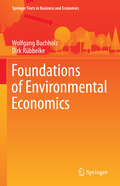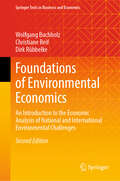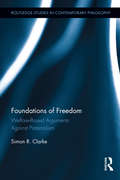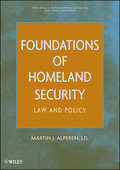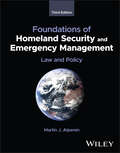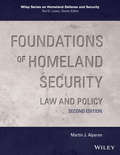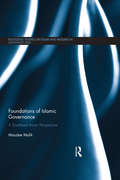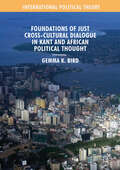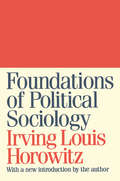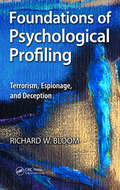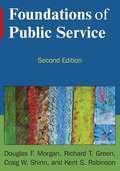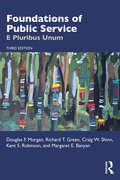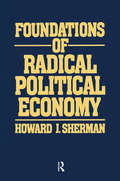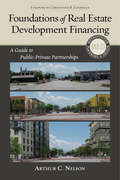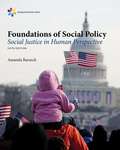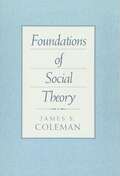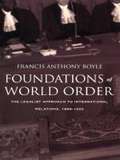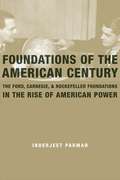- Table View
- List View
Foundations of Environmental Economics (Springer Texts in Business and Economics)
by Wolfgang Buchholz Dirk RübbelkeThis textbook provides a solid introduction to the theoretical and empirical aspects of environmental economics, and their links to environmental policy. It advocates drawing on the economist’s toolbox as a powerful means of finding solutions to environmental problems by addressing the conflict between the societal costs of pollution on the one hand, and the financial costs of emissions reduction on the other. The book presents the main economic theory approaches to handling environmental problems and assessing the monetary value of environmental quality; the most relevant environmental policy instruments and challenges involved in their effective real-world application; and both national and global environmental problems addressed by environmental negotiations and agreements. Given its scope, the book offers a valuable basis of information for students, and for policymakers pursuing effective environmental policies.
Foundations of Environmental Economics: An Introduction to the Economic Analysis of National and International Environmental Challenges (Springer Texts in Business and Economics)
by Wolfgang Buchholz Dirk Rübbelke Christiane ReifThis textbook provides a solid introduction to the theoretical and empirical aspects of environmental economics and their links to environmental policy. In this second edition, all chapters have been updated and restructured, and new sections have been added to reflect a greater focus on climate policy. Starting from the need to balance the social costs of pollution against the financial costs of emission abatement, the book discusses the major issues that arise in the context of environmental policy – such as the potential and limitations of monetary valuation of the environment (and in particular the contingent valuation method) and the design of environmental policy. With regard to the choice of environmental policy instruments, the book focuses on the price-based instruments preferred by economists, i.e., environmental taxes and emissions trading, discussing in detail not only their many advantages but also their drawbacks. The second edition especially focuses on green industrial policy as a complementary measure to price-based instruments, the distributional effects of environmental policies, and the resulting challenges for political feasibility. Moreover, the book deals extensively with international environmental problems, in particular climate protection, which is a global public good that will be underprovided when certain countries refuse to cooperate and contribute. Approaches to overcoming this underprovision are described in far more detail than in the first edition, both theoretically and empirically – in particular by assessing the functions of the many international environmental agreements in this field. Finally, a new chapter considers adaptation strategies, especially in the water sector, as an additional pillar of climate policy.
Foundations of Freedom: Welfare-Based Arguments Against Paternalism (Routledge Studies in Contemporary Philosophy)
by Simon R. ClarkeWhat makes individual freedom valuable? People have always believed in freedom, have sought it, and have sometimes fought and died for it. The belief that it is something to be valued is widespread. But does this belief have a rational foundation? This book examines answers to these questions that are based on the welfare of the person whose freedom is at stake. There are various conceptions of a worthwhile life, a life that is valuable for the person whose life it is. These conceptions will be examined to see whether they are plausible and what their connection, if any, is to freedom. Are they compelling foundations for freedom? Does freedom make a person’s life better or would his/her welfare be advanced by restricting freedom?
Foundations of Governance
by Andrew Sancton Robert A. YoungMunicipalities are responsible for many essential services and have become vital agents for implementing provincial policies, including those dealing with the environment, emergency planning, economic development, and land use. In Foundations of Governance, experts from each of Canada's provinces come together to assess the extent to which municipal governments have the capacity to act autonomously, purposefully, and collaboratively in the intergovernmental arena.Each chapter follows a common template in order to facilitate comparison and covers essential features such as institutional structures, municipal functions, demography, and municipal finances. Canada's municipalities function in diverse ways but have similar problems and, in this way, are illustrative of the importance of local democracy. Foundations of Governance shows that municipal governments require the legitimacy granted by a vibrant democracy in order to successfully negotiate and implement important collective choices about the futures of communities.
Foundations of Homeland Security
by Martin J. AlperenThis book is the complete guide to understanding the structure of homeland security - its underlying law and policy. Created from a broad and in depth, yet edited collection of statutes, policy papers, presidential directives, and other documents, it cultivates a detailed understanding of the foundations of homeland security. It is arranged in a topic-by-topic format structured to include only the documents and statues that affect a particular subject, making for much easier understanding. Thus, the chapter on FEMA contains only the portions of the statutes and other documents that relate to FEMA. There are twenty-five topic areas. It contains hundreds of end notes, references, and suggestions for further study. This book offers important legal guidance that students, law enforcement officers, lawyers, and other homeland security professionals need to accurately interpret, understand, and apply homeland security policy.The Introduction provides an in-depth overview of the subject of homeland security and includes a discussion of what is homeland security, definitions of homeland security and terrorism, what is homeland security law, its development, and what is a homeland security curriculum. There are contributing chapters about homeland security in Europe, and homeland security in China and Japan.
Foundations of Homeland Security and Emergency Management: Law and Policy
by Martin J. AlperenFoundations of Homeland Security and Emergency Management Complete guide to understanding homeland security law The newly revised and updated Third Edition of Foundations of Homeland Security and Emergency Management enables readers to develop a conceptual understanding of the legal foundations of homeland security and emergency management (HSEM) by presenting the primary source law and policy documents we have established to address “all hazards,” both terrorism and natural disasters. The book demonstrates that HSEM involves many specialties and that it must be viewed expansively and in the long-term. The Third Edition has more sources than previous editions and is streamlined with fewer long quotations. It highlights only those portions of the various documents and statutes necessary to provide the reader an understanding of what the law is designed to accomplish. Foundations of Homeland Security and Emergency Management includes information on: WMD, now expanded to include Pandemic Laws Political extremism, domestic threats, Posse Comitatus Act, and Insurrection Act Space Law, comparative Drone Law with Japan, HSEM in Puerto RicoHomeland Security Legal Architecture before 9/11Ethical, Legal, and Social Issues in Homeland SecurityCritical Infrastructure Protection, Resiliency, and Culture of Preparedness With its accessible format, plethora of primary source documentation, and comprehensive coverage of the subject, this book is an essential resource for professionals and advanced students in law enforcement, national and homeland security, emergency management, intelligence, and critical infrastructure protection.
Foundations of Homeland Security: Law and Policy
by Martin J. AlperenThis book is the complete guide to understanding the structure of homeland security - its underlying law and policy. Created from a broad and in depth, yet edited collection of statutes, policy papers, presidential directives, and other documents, it cultivates a detailed understanding of the foundations of homeland security. It is arranged in a topic-by-topic format structured to include only the documents and statues that affect a particular subject, making for much easier understanding. Thus, the chapter on FEMA contains only the portions of the statutes and other documents that relate to FEMA. There are twenty-five topic areas. It contains hundreds of end notes, references, and suggestions for further study. This book offers important legal guidance that students, law enforcement officers, lawyers, and other homeland security professionals need to accurately interpret, understand, and apply homeland security policy. The Introduction provides an in-depth overview of the subject of homeland security and includes a discussion of what is homeland security, definitions of homeland security and terrorism, what is homeland security law, its development, and what is a homeland security curriculum. There are contributing chapters about homeland security in Europe, and homeland security in China and Japan.
Foundations of Islamic Governance: A Southeast Asian Perspective (Routledge Studies on Islam and Muslims in Southeast Asia)
by Maszlee MalikThe aim of this book is to explore and analyze the Islamic axioms, foundation principles and values underpinning the field of governance in an attempt to construct the architectonics of a new systemic and dynamic theory and formulate the articulation of ‘Islamic governance’. This discursive and abstract, rather than being an empirical exercise, assumes to produce a ‘good governance’ framework within its own formulation through a value-shaped dynamic model according to maqasid al-Shari’ah (higher objective of Shari’ah) by going beyond the narrow remit of classical and contemporary discussions produced on the topic, which propose a certain institutional model of governance based on the classical juristic (fiqh) method. Through an exclusive analytical discursive approach in this book, readers will find that Islam as one of the major religions in the contemporary world with the claim of promising the underpinning principles and philosophical foundations of worldly affairs and institutions through a micro method of producing homoIslamicus could contribute towards development of societies by establishing a unique model of governance from its explicit ontological worldview through a directed descriptive epistemology.
Foundations of Just Cross-Cultural Dialogue in Kant and African Political Thought (International Political Theory)
by Gemma K. BirdThis book addresses the potential existence of shared foundational principles in the work of Immanuel Kant and a range of African political thought, as well as their suitability in facilitating just and fair cross-cultural dialogue. The book first establishes an analytical framework grounded in a Kantian approach to understanding shared human principles, suggesting that a drive to be self-law giving may underpin all human interactions regardless of cultural background. It then investigates this assumption by carrying out a theoretical analysis of texts and speeches from a variety of African scholarship, ranging from the colonial period to the present day. The analysis, divided into three distinctive chapters covers the Négritude movement, African socialism and post-colonial philosophers, including such thinkers as: Léopold Sédar Sengor, Julius K Nyerere, Kwame Nkrumah, Kwame Anthony Appiah, Kwasi Wiredu and Kwame Gyekye. The author argues that underpinning each of their very different theoretical positions and arguments is a foundational argument for the importance of self-law giving. In doing so she highlights the need to respect this principle when embarking on cross-cultural dialogues. The book will be of interest to students and scholars in the fields of African political thought, political theory and international relations.
Foundations of Managing Sporting Events: Organising the 1966 FIFA World Cup (Routledge International Studies in Business History #33)
by Kevin D Tennent Alex G. Gillett2016 marks the 50th anniversary of the 1966 FIFA World Cup, hosted in England. Unlike previous literature, which has tended to focus activities on the field, this book brings an institutional level approach to organizing the 1966 FIFA World Cup and examines the management process in the buildup and execution of the event. This intriguing new volume looks at the first significant UK government intervention in football and how this created a significant legacy as the government started to take a real interest in leisure facilities and stadium safety as policy areas after this competition. Foundations of Managing Sporting Events will be of considerable interest to research academics working on aspects of post war British, Imperial, and World history including sport, social, business, economic, and political history.
Foundations of Modern International Thought
by David ArmitageBetween the early seventeenth and mid-nineteenth centuries, major European political thinkers first began to look outside their national borders and envisage a world of competitive, equal sovereign states inhabiting an international sphere that ultimately encompassed the whole globe. In this insightful and wide-ranging work, David Armitage - one of the world's leading historians of political thought - traces the genesis of this international turn in intellectual history. Foundations of Modern International Thought combines important methodological essays, which consider the genealogy of globalisation and the parallel histories of empires and oceans, with fresh considerations of leading figures such as Hobbes, Locke, Burke and Bentham in the history of international thought. The culmination of more than a decade's reflection and research on these issues, this book restores the often overlooked international dimensions to intellectual history and recovers the intellectual dimensions of international history.
Foundations of Political Sociology
by Irving Louis HorowitzWhen initially published in 1972, Foundations of Political Sociology was acknowledged to be the first unified study of the field. It still provides a cross-fertilization of knowledge concerning the interrelation of social class and political power. Taking into account new specializations in social theory, the book covers all major social systems on a comparative international basis. The opening remarks prepared for this new printing provide an estimate of how the field has changed during the past quarter century, and what unexpected challenges have arisen in areas of public trust and personal privacy.This book examines fascism, communism, anarchism, conservatism, and liberalism as systems of rule as well as domains of theory. It is thus a unique effort at linking problems of history with problems of policy. The six sections of the book detail the historical and theoretical antecedents of this relatively new hybrid area in social research: policy coordinates of political sociology, types of social systems, forms of political ideologies, polarities of revolution and counter-revolution, civil-military relations, mass vs. elite contradictions, and threads of consensus and conflict running through these themes."Horowitz presents as his central thesis that in today's world no economic determinism can do justice to social reality. Foundations is the work of a politically sensitive and knowledgeable scholar." Louis Schneider, Social Forces"Foundations of Political Sociology reflects extensive teaching and research in the area of political sociology. The book combines analytical insight with a provocative cutting edge and represents the best of Professor Horowitz." Thomas R. McFaul, The Annals"Horowitz's political stance is interesting. Though he knows the radical literature, he distances himself from it. He sympathizes with everyone and strives to be provocative and yet elusive a personal voice in a dogmatic discipline." W.J.M. Mackenzie, Political Studies
Foundations of Psychological Profiling: Terrorism, Espionage, and Deception
by Richard BloomProfiling is a hot topic today. The post-9/11 "War on Terrorism" has engendered political, ethical, and scientific controversy over its use. The proliferation of recent films, television programs, and books is a sociocultural indicator of widespread interest. Designed for a diverse audience including law enforcement officers, intelligence and secur
Foundations of Public Service
by Robert K Robinson Douglas F Morgan Douglas F. Green Richard T Green Craig W ShinnDesigned to serve as a basic text for an introductory course in Public Administration, this innovative work provides students with an understanding of the basic management functions that are covered in all standard textbooks with two important differences.First, it is written to address the needs of both the experienced practitioner and the entry-level public servant. Case examples bridge the content-rich environment of practitioners with the basic principles of public administration sought by pre-service students.Second, the discussion of basic management practices is grounded in the political and ethical tensions inherent in the American constitutional form of governance. This reflects the authors' belief that public administration operates as an integral part of the country's political traditions, and thereby helps define the political culture. The book provides a framework for understanding American political traditions and how they inform public administration as a political practice.Key Changes in the Second Edition include:A new introductory chapter that explains what the authors mean by a constitutional approach and why that is important.An expanded discussion of the role of civil society in promoting the common good. A new section in chapter 5 on New Public Governance. Updated exhibits that incorporate up-to-date census data and revenue figures (chapter 10). A new section in chapter 14 that recognises the importance of maintaining accountability in contract and networked systems of governance. Significantly rewritten chapters to add emphasis on the relevance of the chapter material to nonprofit organisations. A significantly revised bibliography which incorporates new bodies of research that have appeared since the first edition.
Foundations of Public Service: E Pluribus Unum
by Kent S. Robinson Douglas F. Morgan Craig W. Shinn Richard T. Green Margaret E. BanyanDesigned to serve as a basic text for introductory courses in public administration, this pioneering work provides students with a clear-eyed understanding of the vital management functions covered in most standard textbooks with two important differences. First, it is written to address the needs of both the experienced practitioner and the entry-level public servant. Case examples bridge the content-rich environment of practitioners with the principles of public administration sought by pre-service students. Second, the discussion of management practices is grounded in the political and ethical tensions inherent in the American constitutional form of governance. This innovative approach reflects the authors' belief that public administration operates as an integral part of the country's political traditions, and thereby helps define the political culture. Key themes in this third edition include: • an emphasis on the ways in which public administration and their agents play a critical role in ensuring legal and political accountability of the political system; • an exploration of local public administration as the backstop of American democracy, requiring a close working partnership between part-time elected officials and career administrators; • careful examination of the ways in which the American political economy requires administrators who are skilled at co-producing the common good with voluntary associations, businesses, nonprofit organizations and other governmental entities; • an understanding that public administration plays a critical role with its prudential judgments in balancing the competing values necessary to secure a regime of ordered liberty. Every chapter has been thoroughly updated, with particular attention paid to chapters on budgeting and revenue, e-government and the digital divide, shared power and the rise of "wicked problems," and the future of public administration in the United States amidst deep polarization. Foundations of Public Service, 3rd Edition provides a framework for understanding American political traditions and how they inform public administration as a political practice. It is required reading for all introductory Public Administration courses with an emphasis on practice and real-world applications.
Foundations of Radical Political Economy
by Howard J ShermanFirst published in 1987. Similar in content to Sherman’s previous book, Radical Political Economy, it covers most of the same issues and reaches the same overall conclusion in favour of democracy and socialism. Many of the analyses and conclusions on particular subjects, however, have changed because of the flood of new literature in every area of radical political economy and because the world has changed. The most important issue is the prevention of nuclear war.
Foundations of Real Estate Development Financing: A Guide to Public-Private Partnerships (Metropolitan Planning + Design)
by Arhur C. NelsonAmerica's landscape is undergoing a profound transformation as demand grows for a different kind of American Dream--smaller homes on smaller lots, multifamily options, and walkable neighborhoods. This trend presents a tremendous opportunity to reinvent our urban and suburban areas. But in a time of fiscal austerity, how do we finance redevelopment needs? InFoundations of Real Estate Development Finance: A Guide for Public-Private Partnerships, urban scholar Arthur C. Nelson argues that efficient redevelopment depends on the ability to leverage resources through partnerships. Public-private partnerships are increasingly important in reducing the complexity and lowering the risk of redevelopment projects. Although planners are an integral part of creating these partnerships, their training does generally not include real-estate financing, which presents challenges and imbalances in public-private partnership. This is the first primer on financing urban redevelopment written for practicing planners and public administrators. In easy-to-understand language, it will inform readers of the natural cycle of urban development, explain how to overcome barriers to efficient redevelopment, what it takes for the private sector to justify its redevelopment investments, and the role of public and nonprofit sectors to leverage private sector redevelopment where the market does not generate sufficient rates of return. This is a must read for practicing planners and planning students, economic development officials, public administrators, and others who need to understand how to leverage public and non-profit resources to leverage private funds for redevelopment.
Foundations of Social Policy: Social Justice in Human Perspective (Sixth Edition) (Empowerment Series)
by Amanda Smith Barusch<p>Reflecting the idea that social justice is a primary mission of the social work profession, this text provides a thorough grounding in policy analysis -- with coverage of policy practice and a unique emphasis on the human dilemmas inherent in the pursuit of social justice. Aligned with current standards and core competencies, Foundations of <p>Social Policy, 6th Edition introduces you to philosophical perspectives on what constitutes social justice, and identifies values and assumptions reflected in contemporary policy debates. Students have said they like how this book deepens their understanding of current developments, including topics straight from the headlines. The book also introduces you to people whose lives are influenced by U.S. policies, as well as to those who have shaped the policies.</p>
Foundations of Social Theory
by James ColemanCombining principles of individual rational choice with a sociological conception of collective action, James Coleman recasts social theory in a bold new way. The result is a landmark in sociological theory, capable of describing both stability and change in social systems. This book provides for the first time a sound theoretical foundation for linking the behavior of individuals to organizational behavior and then to society as a whole. The power of the theory is especially apparent when Coleman analyzes corporate actors, such as large corporations and trade unions. He examines the creation of these institutions, collective decision making, and the processes through which authority is revoked in revolts and revolutions. Coleman discusses the problems of holding institutions responsible for their actions as well as their incompatibility with the family. He also provides a simple mathematical analysis corresponding to and carrying further the verbal formulations of the theory. Finally, he generates research techniques that will permit quantitative testing of the theory.
Foundations of World Order: The Legalist Approach to International Relations, 1898–1922
by Francis Anthony BoyleIn Foundations of World Order Francis Anthony Boyle provides the first historically comprehensive analysis of U.S. foreign policy regarding international law and organizations. Examining the period from the Spanish American War to the establishment of the League of Nations and the Permanent Court of International Justice, Boyle argues that the international legal framework created at the beginning of the twentieth century not only influenced the course of American foreign policy but also provided the foundation upon which relations among states were built. Although both the League of Nations and the Permanent Court of International Justice were rejected by the U.S. Senate, Boyle shows how the early governance of these institutions--precursors, respectively, to the United Nations and the International Court of Justice--informed later efforts to reduce and regulate transnational threats and the use of military force. Delving into such topics as the United States and its initial stance of neutrality in World War I and its imperial policy toward Latin America and the Caribbean, Boyle offers detailed readings of the relevant treaties, tribunals, and conferences, and assesses the political actors involved. Taking up the legalist point of view, he discusses the codification of customary international law, the obligatory arbitration of international disputes, and the creation of a new regime for the settlement of such disputes. Boyle has provided in Foundations of World Order a compelling portrait of the relationship between political power and law, and of the impact of these forces on U.S. diplomacy. This volume will serve as a valuable resource to students, scholars, and practitioners of international law; it will also be of great interest to historians and political scientists engaged with issues of U.S. foreign policy and diplomatic history.
Foundations of the American Century
by Inderjeet ParmarInderjeet Parmar reveals the complex interrelations, shared mindsets, and collaborative efforts of influential public and private organizations in the building of American hegemony. Focusing on the involvement of the Ford, Rockefeller, and Carnegie foundations in U.S. foreign affairs, Parmar marks the transformation of America from an "isolationist" nation into the world's only superpower, all in the name of benevolent stewardship.Parmar begins in the 1920s with the establishment of these foundations and their system of top-down, elitist, scientific giving, which focused more on effecting social, political, and economic change than in solving modern society's structural problems. Consulting rare documents and other archival materials, he recounts how the American intellectuals, academics, and policy makers affiliated with these organizations institutionalized such elitism, which then bled into the machinery of U.S. foreign policy and became regarded as the essence of modernity. America hoped to replace Britain in the role of global hegemon and created the necessary political, ideological, military, and institutional capacity to do so, yet far from being objective, the Ford, Rockefeller, and Carnegie foundations often advanced U.S. interests at the expense of other nations. Incorporating case studies of American philanthropy in Nigeria, Chile, and Indonesia to support his argument, Parmar boldly exposes the knowledge networks underwriting American dominance in the twentieth century.
Foundations of the American Century
by Inderjeet ParmarInderjeet Parmar reveals the complex interrelations, shared mindsets, and collaborative efforts of influential public and private organizations in the building of American hegemony. Focusing on the involvement of the Ford, Rockefeller, and Carnegie foundations in U.S. foreign affairs, Parmar traces the transformation of America from an "isolationist" nation into the world's only superpower, all in the name of benevolent stewardship.Parmar begins in the 1920s with the establishment of these foundations and their system of top-down, elitist, scientific giving, which focused more on managing social, political, and economic change than on solving modern society's structural problems. Consulting rare documents and other archival materials, he recounts how the American intellectuals, academics, and policy makers affiliated with these organizations institutionalized such elitism, which then bled into the machinery of U.S. foreign policy and became regarded as the essence of modernity.America hoped to replace Britain in the role of global hegemon and created the necessary political, ideological, military, and institutional capacity to do so, yet far from being objective, the Ford, Rockefeller, and Carnegie foundations often advanced U.S. interests at the expense of other nations. Incorporating case studies of American philanthropy in Nigeria, Chile, and Indonesia, Parmar boldly exposes the knowledge networks underwriting American dominance in the twentieth century.
Foundations of the American Century: The Ford, Carnegie, and Rockefeller Foundations in the Rise of American Power
by Inderjeet ParmarA provocative study of the ideologically motivated, big-business-dominated, expansionist impulses of American philanthropy.
Foundations of the American Century: The Ford, Carnegie, and Rockefeller Foundations in the Rise of American Power
by Inderjeet ParmarInderjeet Parmar reveals the complex interrelations, shared mindsets, and collaborative efforts of influential public and private organizations in the building of American hegemony. Focusing on the involvement of the Ford, Rockefeller, and Carnegie foundations in U.S. foreign affairs, Parmar traces the transformation of America from an "isolationist" nation into the world's only superpower, all in the name of benevolent stewardship.Parmar begins in the 1920s with the establishment of these foundations and their system of top-down, elitist, scientific giving, which focused more on managing social, political, and economic change than on solving modern society's structural problems. Consulting rare documents and other archival materials, he recounts how the American intellectuals, academics, and policy makers affiliated with these organizations institutionalized such elitism, which then bled into the machinery of U.S. foreign policy and became regarded as the essence of modernity. America hoped to replace Britain in the role of global hegemon and created the necessary political, ideological, military, and institutional capacity to do so, yet far from being objective, the Ford, Rockefeller, and Carnegie foundations often advanced U.S. interests at the expense of other nations. Incorporating case studies of American philanthropy in Nigeria, Chile, and Indonesia, Parmar boldly exposes the knowledge networks underwriting American dominance in the twentieth century.
Foundations of the Islamic State: Management, Money, and Terror in Iraq, 2005-2010
by Benjamin Bahney Howard J. Shatz Jacob N. Shapiro Jonathan Wallace Patrick K. Ryan Patrick B. Johnston Danielle F. JungDrawing from 140 recently declassified documents, this report comprehensively examines the organization, territorial designs, management, personnel policies, and finances of the Islamic State of Iraq (ISI) and al-Qa'ida in Iraq. Analysis of the Islamic State predecessor groups is more than a historical recounting. It provides significant understanding of how ISI evolved into the present-day Islamic State and how to combat the group.
